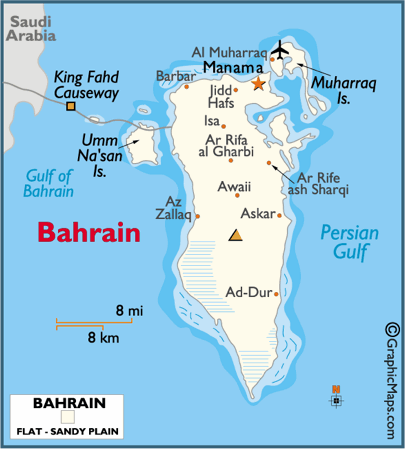Troops from the GCC Peninsula Shield Forces, originating mostly from Saudi Arabia but also the United Arab Emirates, arrived in Bahrain today. When the Bahraini Crown Prince visited Saudi Arabia last week, he was given an ultimatum and a deadline: either the Bahraini government takes control of the situation and ends the month old anti-government protests, or Saudi Arabia would send its troops to do the job. While Bahrain’s ruler did issue an appeal for help to the GCC, critics have said that this was in response to pressure by Saudi Arabia, whose deadline given to the Bahraini ruler expired last night. According to the BBC, yesterday Saudi King Abdullah informed the US administration of the decision to send GCC troops into Bahrain to quell the pro-democracy protests. Today the White House announced that it does not consider the entry of over 1000 foreign troops--mostly Saudi Arabian--into Bahrain an “invasion” and called on the Bahraini government to “exercise restraint.”
Omanis and Kuwaitis have threatened their respective governments with major strikes if their national troops are sent with the GCC Shield Forces into Bahrain. Foreign journalists have reported being harassed by the Bahraini government in the lead up to the troops’ arrival, with many journalists “asked” to leave the country by the end of the day. Others have simply been refused entry into Bahrain at the airport. The UK has issued a travel advisory warning its citizens against travel to Bahrain, and Saudi Arabia has evacuated its students who attend universities in the neighboring island.
Tens of thousands of demonstrators gathered at the now famous Pearl Roundabout today in response to the news of foreign troops reaching Bahrain.
Tens of casualties have been reported due to clashes between protesters and pro-government thugs using live ammunition. According to eye witness accounts from Bahrain, pro-government thugs are wreaking havoc everyhwere, trying to create the impression that the security situation is out of control, dangerous, and merits foreign GCC military intervention. The use of tear gas and rubber bullets has also been reported in several Bahraini towns, including Dar Kleyb and Shahrakan. As opposition figures currently meet with the King, Bahrain TV has announced that the second wave of GCC
Shield Troops has arrived in Bahrain.
Below is a Jadaliyya Reports translation of a plea by civil society institutions and political parties allied to the opposition in Bahrain calling on the United Nations Secretary General to convene the Security Council and prevent what they see as a foreign military intervention by the GCC. The original Arabic version is reproduced below the translation, followed by several videos and links related to these recent developments.
14 March 2011
Urgent Appeal: Save the people of Bahrain from the threat of a foreign army.
Mr. Ban Ki-moon
Secretary General of the United Nations
We are the people of Bahrain, and when we went out in a peaceful and civilized manner to demand our rights that are guaranteed under international conventions, our demands were met with violent campaigns planned by the security and military apparatuses and executed by those under its command.
The more dangerous development at the time of writing this urgent appeal is the serious threat of entry by Saudi Arabian and other Gulf forces to confront the isolated, unarmed people of Bahrain. This situation means that the people of Bahrain are in real danger of being threatened with a [real] war waged by an armed force against the citizens of Bahrain without [having issued] a formal [public] declaration of war. We consider the entry of any soldier or military vehicle into the territory--whether air space, land, or waters--of the Kingdom of Bahrain an occupation of the Kingdom of Bahrain, a conspiracy against the isolated people of Bahrain, and a in violation of international treaties and international understandings of war and peace.
We thus call on the international community to shoulder the responsibility of international peace and security in a speedy manner, to protect the people of Bahrain from the dangers of foreign military intervention, to urgently move towards preventing any soldiers and military vehicles from entering the territories of Bahrain, and to take whatever necessary steps are needed to protect civilians by calling on the Security Council to hold an immediate emergency session to discuss these developments.
Signed by the following political societies and the National Coalition:
al-Wifaq National Islamic Society
National Democratic Action Society
al-Minbar Progressive Democratic Society
Nationalist Democratic Gathering Society
Islamic Action Society
al-Ikha’ National Society
National Democratic Gathering Society
The National Coalition
This image shows the original Arabic appeal that has been circulating on the internet.

These two videos show footage of GCC Forces entering Bahrain. The first was aired by Bahrain TV and provides a sense of the framing that Bahrain and other GCC member states are using to justify this intervention. The second video is amature footage and shows the extent of the military convoy entering Bahrain.
For a sense of the small geographic size of Bahrain and its proximity to Saudi Arabia, see the below map.

For a concise historical overview of regime-opposition dynamics in Bahrain, see "Distorions of Dialogue."
For video footage of this past weekend`s violent dispersal of protestests in Bahrain, see our "Bahrain this Weekend: An Invitation to Dialogue Through Violence."
Also see our Notes from the Bahraini Field Update 1, Update 2, Update 3, Update 4, and Update 5.